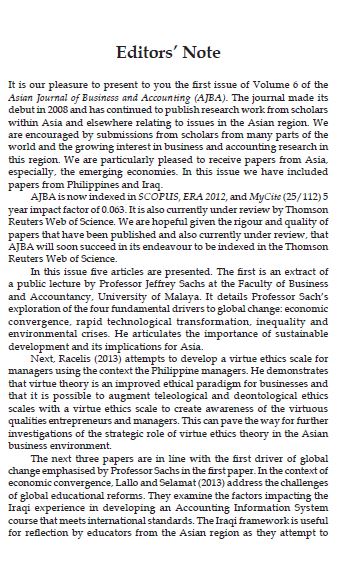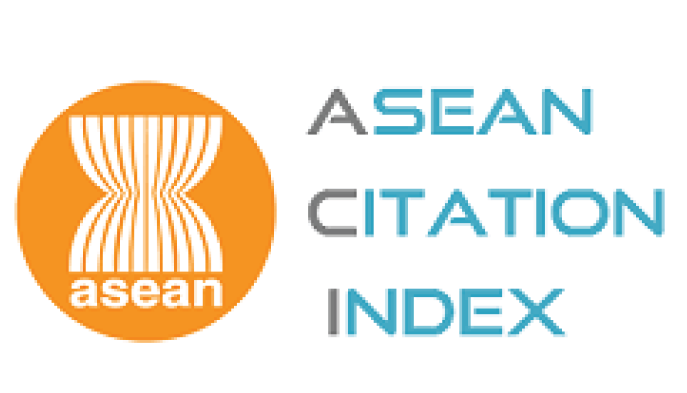Editor's Note
Abstract
It is our pleasure to present to you the first issue of Volume 6 of the
Asian Journal of Business and Accounting (AJBA). The journal made its
debut in 2008 and has continued to publish research work from scholars
within Asia and elsewhere relating to issues in the Asian region. We
are encouraged by submissions from scholars from many parts of the
world and the growing interest in business and accounting research in
this region. We are particularly pleased to receive papers from Asia,
especially, the emerging economies. In this issue we have included
papers from Philippines and Iraq.
AJBA is now indexed in SCOPUS, ERA 2012, and MyCite (25/112) 5
year impact factor of 0.063. It is also currently under review by Thomson
Reuters Web of Science. We are hopeful given the rigour and quality of
papers that have been published and also currently under review, that
AJBA will soon succeed in its endeavour to be indexed in the Thomson
Reuters Web of Science.
In this issue five articles are presented. The first is an extract of
a public lecture by Professor Jeffrey Sachs at the Faculty of Business
and Accountancy, University of Malaya. It details Professor Sach’s
exploration of the four fundamental drivers to global change: economic
convergence, rapid technological transformation, inequality and
environmental crises. He articulates the importance of sustainable
development and its implications for Asia.
Next, Racelis (2013) attempts to develop a virtue ethics scale for
managers using the context the Philippine managers. He demonstrates
that virtue theory is an improved ethical paradigm for businesses and
that it is possible to augment teleological and deontological ethics
scales with a virtue ethics scale to create awareness of the virtuous
qualities entrepreneurs and managers. This can pave the way for further
investigations of the strategic role of virtue ethics theory in the Asian
business environment.
The next three papers are in line with the first driver of global
change emphasised by Professor Sachs in the first paper. In the context of
economic convergence, Lallo and Selamat (2013) address the challenges
of global educational reforms. They examine the factors impacting the
Iraqi experience in developing an Accounting Information System
course that meets international standards. The Iraqi framework is useful
for reflection by educators from the Asian region as they attempt to convergence, specifically in accounting and financial reporting.
The issue of international accounting convergence is addressed
by Pawsey, Brown and Chatterjee (2013) who examine the responses
to the U.S. Securities Commission’s proposal to allow U.S. listed
companies to prepare financial statements following the International
Financial Reporting Standards (IFRS). The paper is useful for reflection
by researchers and regulators in Asian region as most Asian countries
have embarked on this convergence agenda. The implications for the
Asian region are discussed in this paper.
The final paper, Phang and Mahzan (2013) investigate the Malaysian
experience in converging to IFRS. They identify the external drivers that
influence the readiness of Malaysian listed firms for IFRS convergence.
They draw upon Institutional theory to explain IFRS convergence in
Malaysia. The paper provides insights to researchers from emerging
economies and suggests strategies to regulators and other stakeholders
in the financial reporting process to facilitate the convergence process.
In conclusion we thank all our area editors, members of the editorial
board and advisory board and reviewers for their continued support
and encouragement. We hope this issue brings AJBA closer to achieving
its mission to incrementally provide a voice for scholars embarking on
Asia-focused research.
Downloads








